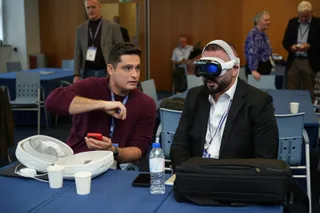Bryan Healea Creates RIC’s First Student-Designed Simulation
Contact Our Team
For more information about how Halldale can add value to your marketing and promotional campaigns or to discuss event exhibitor and sponsorship opportunities, contact our team to find out more
The Americas -
holly.foster@halldale.com
Rest of World -
jeremy@halldale.com
Bryan Healea, a retired U.S. Air Force captain and a senior in RIC’s Bachelor of Science in Nursing program, developed a simulation to train the next generation of student nurses and to benefit the School of Nursing for years to come.
Inspired by a simulation conference he attended with Penni Sadlon, director of RIC’s Simulation Center, Healea said, “I learned so much that I wanted to give back to the School of Nursing and create a senior honors project that would be of benefit to the school.”
According to Jane Williams, dean of the School of Nursing, simulation learning is the most effective way to prepare students to treat real patients. In a simulation environment, either computerized mannequins or live actors play the role of patients to add physical and emotional components to the presenting crises. Simulations are then videotaped and critiqued at debriefings. RIC and Yale have the only accredited nursing school simulation labs in the Northeast.
Set in an emergency room environment, Healea’s simulation involves a patient who is in pain, who is agitated and who begins to escalate. The challenge for the student nurse is to use verbal de-escalation – talk the patient down – before the situation erupts.
The first phase of the project involved researching for evidence that would support the benefits of the training. “It turns out that verbal de-escalation reduces the need to use restraints and/or medication,” Healea said. “The evidence shows that it works.”
The second phase involved finding evidence-based practices – the best methods to use – in verbal de-escalation. The final phase involved writing the script.


